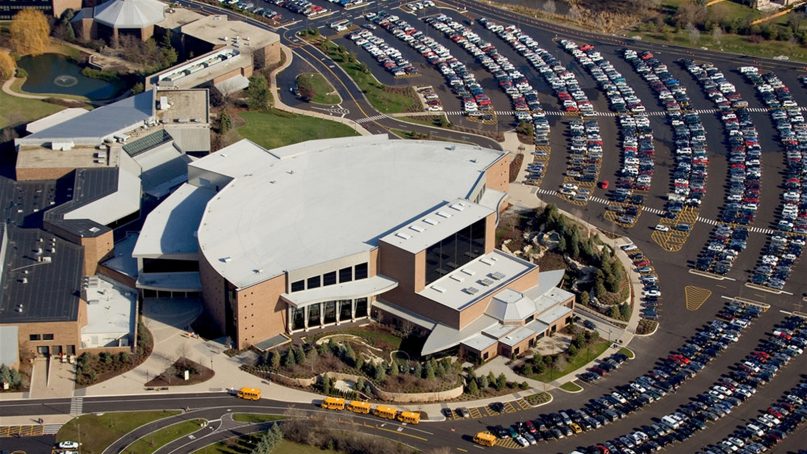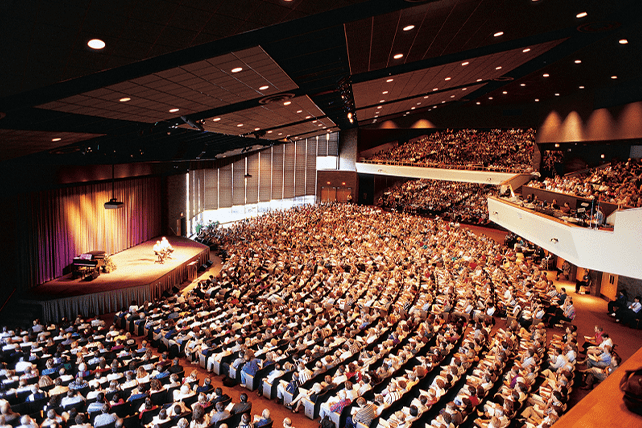He has stayed, he said, for his friendships, and because of the church’s extensive outreach programs, including a prison ministry he has volunteered with. “That’s not tame, we’re-going-through-the-motions church stuff,” he said.
But those who remember Willow’s full arc are more tentative. Beach, who was one of the women alleging misconduct by Hybels, said, “I do think God used the church in a remarkable way, and I got to be a part of that, but then this just deep sadness that leadership failed us in other ways.”
These days, she also prays for the current leaders of Willow Creek, saying she is hopeful for the church’s future
“I’m not saying it has to be huge again, or it has to be a trailblazer,” she said. “I just want it to be a healthy biblical community for the people that it can reach there.
Dave Burrage, 62, first visited Willow Creek in the early 1980s while a student at the University of Wisconsin. After graduation, Burrage moved to the area and began attending Willow. Before long, he’d joined one of the groups for young singles and become a small-group Bible study leader. “That’s how I got very plugged in at Willow — through serving,” he said.
Over the decades, he said, Willow Creek’s mission has stayed the same. “Back in the day, it might have been a desire to see people become fully mature in Christ,” he said. “Now, we talk about being rooted in Christ.”
Burrage said that in recent years, he’s been encouraged by growth in diversity at the church. “If you attend Willow at this point on a given Sunday, you will see a tremendous amount of diversity,” he said. “That’s been a really healthy thing.
Burrage believes Willow has been humbled by the failings of Hybels and all that followed. Some of his friends found it too painful to be at the church, but Burrage stayed because he had ties that went beyond the leaders and because he believed in the mission and ministry.
The longtime church member remains saddened that Hybels has disappeared. “It’s a really stark reminder that not all stories end well,” he said.
Few expect Willow to recapture its past glory, an assessment Thumma agreed with. That’s in part because Willow’s size and approach to ministry are no longer unique.

Pastor Shawn Williams preaches at Willow Creek Community Church in South Barrington, Ill., on Sept. 7, 2025. (RNS photo/Carlos Javier Ortiz)
In the early 1990s, an attendance of 10,000 would make a church one of the largest in the country. Today, more than 90 churches average more than 10,000 attenders; at least 30 churches pull in more than 15,000. The largest church in the country, Life.Church, based in Edmond, Oklahoma, claims to draw 85,000 to its more than 40 locations, according to Outreach Magazine’s list of the largest churches in the country.
Thumma said America has also changed in the 50 years since Willow was founded. Most of the people Willow attracted in the early decades had at least some experience of Christianity. “It wasn’t like they were completely ignorant of what it meant to go to church or to be a Christian,” he said.
Today, a growing number of people have none of that residual knowledge or experience of Christianity, especially younger Americans. According to Pew Research, 44% of Americans aged 18-25 have no religious affiliation.
But the megachurches that have surpassed Willow Creek have done so by perfecting what Hybels and Willow Creek started in 1975. A good many other megachurch pastors have followed Hybels into ignominy, having broken the trust of people who got them there.

FILE – The main campus of Willow Creek Community Church in South Barrington, Ill. (Photo courtesy of Willow Creek Community Church)
Others have thrived. And former leaders at Willow have gone on to start new churches, head major Christian nonprofits or other ministries, continuing on the church’s vision of building up the faithful and sending them out in the world to do good.
Not all stories end well. But the young people who invested their lives in the church 50 years ago — and those who continue to believe in the mission — hope that the story of Willow Creek will endure.
“I would love Willow to be a place where people constantly find hope,” said Williams, in looking to the church’s future. “And hope can come in a lot of different ways. It might be hope for my marriage, it might be hope for me as a parent, it might be hope for my next meal. It might be eternal, spiritual hope. Hope comes in a lot of ways, but our heart dies when we don’t have hope.”
This article originally appeared here.

